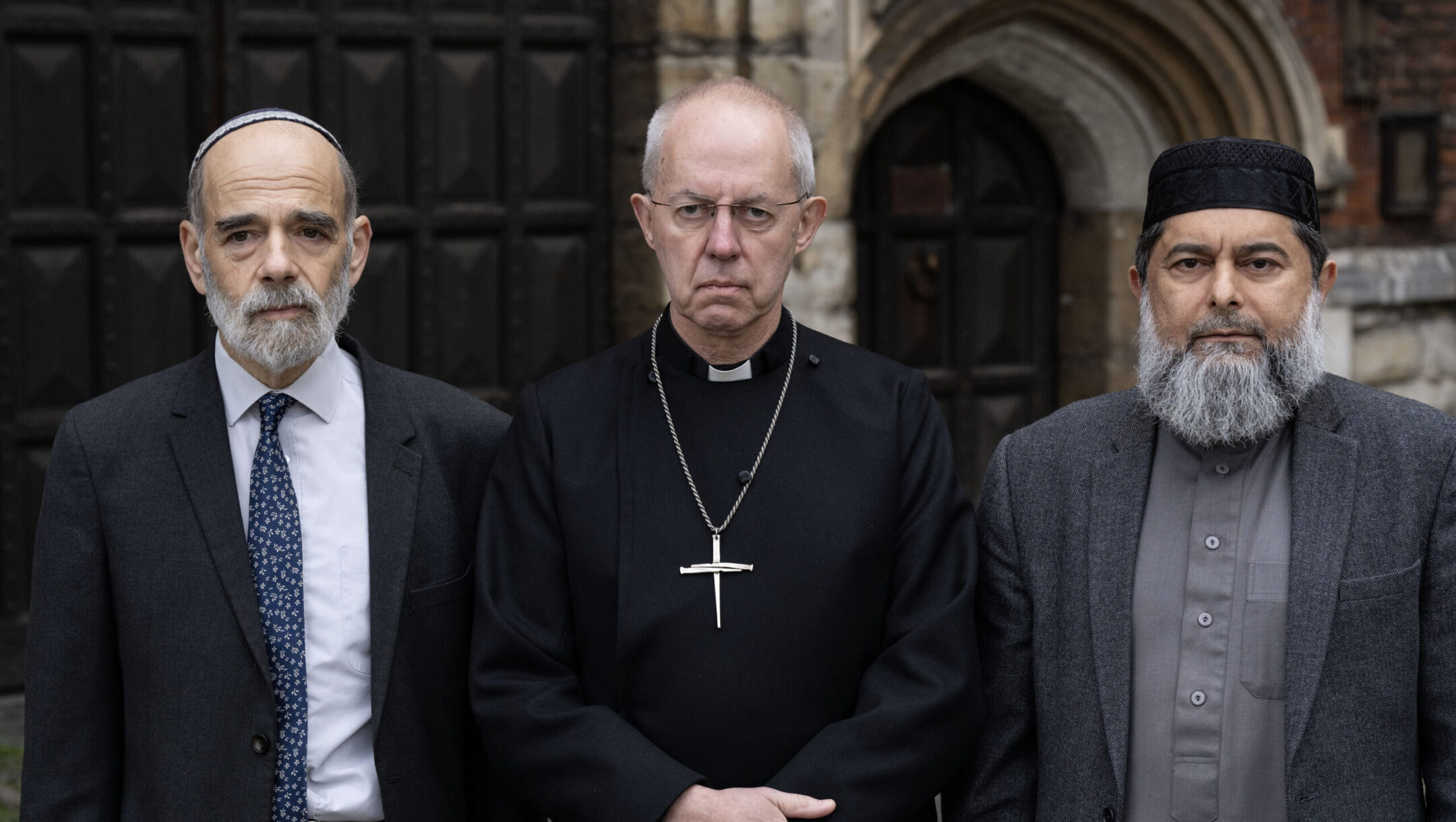Leading British rabbi warns against Rafah invasion: ‘If I said nothing, I couldn’t live with myself’
Rabbi Jonathan Wittenberg, chief rabbi of Masorti Judaism in the U.K., is likely the highest-profile European Jewish leader to question the Israel-Hamas war

(L-R) Rabbi Jonathan Wittenberg, Archbishop of Canterbury Justin Welby and Sheikh Ibrahim Mogra make a statement at Lambeth Palace in London urging peace among faith communities in the United Kingdom, following the onset of the Israel-Hamas war, Oct. 17, 2023. (Doug Peters/PA Images via Getty Images)
(JTA) — The head rabbi of Britain’s Masorti movement published a statement Tuesday opposing a threatened Israel invasion of Rafah in southern Gaza and urging “another, political, path forward.”
The statement makes Rabbi Jonathan Wittenberg possibly the highest-profile European Jewish leader to express misgivings about Israel’s war in Gaza since Hamas’ Oct. 7 attack on Israel.
“These words are written out of deep concern about Israel’s actions and potential actions in Rafah, making it impossible to remain silent,” Wittenberg said in the statement, which was published by Masorti Judaism on its social media channels. Masorti is the British parallel to the Conservative movement in the United States.
“I write out of horror at what may ensue and its potential consequences in unimaginable suffering. I write out of dread at the future hatred this is likely to engender, and out of fear that these actions may haunt us, and the good name of Israel and the Jewish People, for generations,” wrote Wittenberg, who also helms the New North London Synagogue, one of the biggest Jewish congregations in the United Kingdom, with over 3,700 members.
Wittenberg did not call for a ceasefire, a demand of left-wing and pro-Palestinian activists that Israel rejects because it would leave Hamas in power in Gaza. Still, his statement is unusual among Jewish leaders in Europe, where Jewish communities tend to be more pro-Israel, on average, than in the United States. Several prominent American rabbis have expressed grave concern about the plight of the Palestinians and about Netanyahu’s handling of the war.
“I did this because I just felt I had to,” Wittenberg told the Jewish Telegraphic Agency. “I love Israel, I have many friends there, I have deep concerns for Israel’s future. … I thought that my conscience prompted me to say something about it.”
He added, “I was careful not to say, ‘This is what must happen,’ but I’m just saying from a Jewish point of view, and an ethical point of view, it’s extraordinarily painful, and every life matters.”
Wittenberg’s statement comes as Israeli Prime Minister Benjamin Netanyahu has warned of a “major operation” in Rafah, which he says is needed to “collapse” the remaining Hamas battalions thought to be sheltering there alongside Gazan civilians. On Sunday, Israel conducted an operation to rescue two hostages in Rafah in which dozens of Palestinians were also reportedly killed.
The plans for an invasion have raised alarms because more than 1 million people are currently seeking refuge in Rafah, a city near the Egyptian border where Gazans were told to go when Israel invaded Gaza City and Khan Younis. Netanyahu has agreed to American requests to evacuate civilians from the city, but it is unclear where they will be able to go.
“I write in prayer that another, political, path forward will be forged, and that the God of Israel and all humanity will help us find a way to a peaceful resolution, with security for Israel and a viable future for the civilian population of Gaza, without any more appalling bloodshed,” Wittenberg wrote at the statement’s conclusion.
Wittenberg said he had heard only gratitude from people to whom he had spoken about his statement. He has previously issued statements critical of the Israeli government, including when Netanyahu was advancing changes to the country’s judiciary last year that were widely denounced in the Diaspora. He has also long participated in interfaith collaboration in England, including shortly after Oct. 7, when he appeared with the Archbishop of Canterbury and Sheikh Ibrahim Mogra, a prominent British imam, to call for peace among religious communities amid the Israel-Hamas war.
Wittenberg visited Israel in early November, which he wrote about on his blog, and is set to head back in another two weeks.
“The country is in trauma, and I wanted to be there to listen to people and be as supportive as I can,” he said. “But I felt that if I said nothing, I couldn’t live with myself.”
This article originally appeared on JTA.org.















